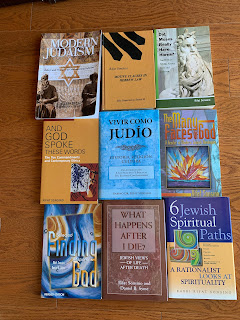Rabbi Rifat Sonsino, Ph.D
Many Jews believe they are God’s chosen people.
The concept is already in the Hebrew Bible: “Of all the people on
earth, the Lord your God chose you to be His treasured people” (Deut. 7: 6b).
It was promoted by the prophets: “But you, Israel, My servant, Jacob, whom I
have chosen” (Isa. 41:8). It was taken for granted by many medieval Jewish
philosophers: Thus, for example, Judah Halevi (12th cent), in his
magnum opus, The Kuzari, argued that Jews were special, because they distinguished
themselves from other people by godly qualities and attained the high degree of
prophecy(1). It is even enshrined in our present liturgy, when a reader of the
Torah recites, “Blessed is the Lord our God, Ruler of the Universe, who has
chosen us from all peoples by giving us His Torah.”
The idea was taken over by the early Christians too, as , for
example, when I Peter considered the Church “a chosen race, a royal priesthood,
a consecrated nation, a people set apart” (2:9).
Yet, even some Jews in the past realized that this election came in
with a heavy responsibility. The Israelites were expected to observe God’s
teachings and had to be better than others. As the prophet Amos declares, “You
alone have I singled out of all the families of the earth –that is why I will
call you to account for all your iniquities” (Amos 3:2, JPS).
However, the anti-Semitism that Jews faced in the past and even in
our time (i.e. the Holocaust), brought into question the veracity of the concept
of God’s election of Israel, with some even jokingly suggesting that God,
perhaps, should choose another people. Besides, the idea of chosenness smack of
self-aggrandizement to assume that Jews were chosen by God.
Consequently, a different interpretation of the concept was
proposed. Thus, for example, Rabbi Eugene
Borowitz (d. 2016), stated that “Jews were chosen to serve God through life of
special duty, not to receive an abundance of privilege or power.” (2) Similarly,
Rabbi Roland Gittelsohn (d.1995), wrote, “We were chosen for special service to
God…Not for privilege are we a special people, but for responsibility.” (3) But it was Rabbi Mordecai Kaplan (d.1983),
the founder of the Reconstructionist movement in Judaism, who took a bolder
position when he asked that the entire concept be abandoned. At best, he
stated, Jews have a “vocation” to pursue truth and righteousness. (4)
The concept of God’s election of the Israelites may have played an
important role in the past, but it is historically and theologically
questionable today. It is time to give it up for good. For me, a religious naturalist,
the feeling of being chosen has to do with the sense of pride I have in being a
Jew. We are, I would argue, not a chosen people but a choosing people, who have
opted to follow a certain path dictated by our past sages, and have contributed
to the well-being of our society through our teachings of monotheism, our
special view on life and through our
contribution to the arts and sciences of all times. That is enough to make me a
proud Jew. As we find in the “Statement of Principles for Reform Judaism”
(1999), “Partners with God in tikkun olam, repairing the world, we are
called to help bring nearer the Messianic age” that represents the best of what
can be achieved in our societal life.
Probably, we also need a new prayer before the Torah reading! How
about, “We invoke the divine in life and express gratitude for the opportunity
to study and practice Torah”?
FOOT NOTES:
1.
Judah
Halevi, The Kuzari, H. Slonimsky, Schocken, NY, 1964, 1: 103.
2.
Eugene
Borowitz, Liberal Judaism, UACH, NY, 1984, 54.
3.
Ronald
B. Gittelsohn, Little Lower than the Angels, UACH, NY, 1955, 209, 210.
4.
W.
Gunther Plaut, The Growth of Reform Judaism, WUPJ, NY, 1965, 177.
Date: March 22, 22
